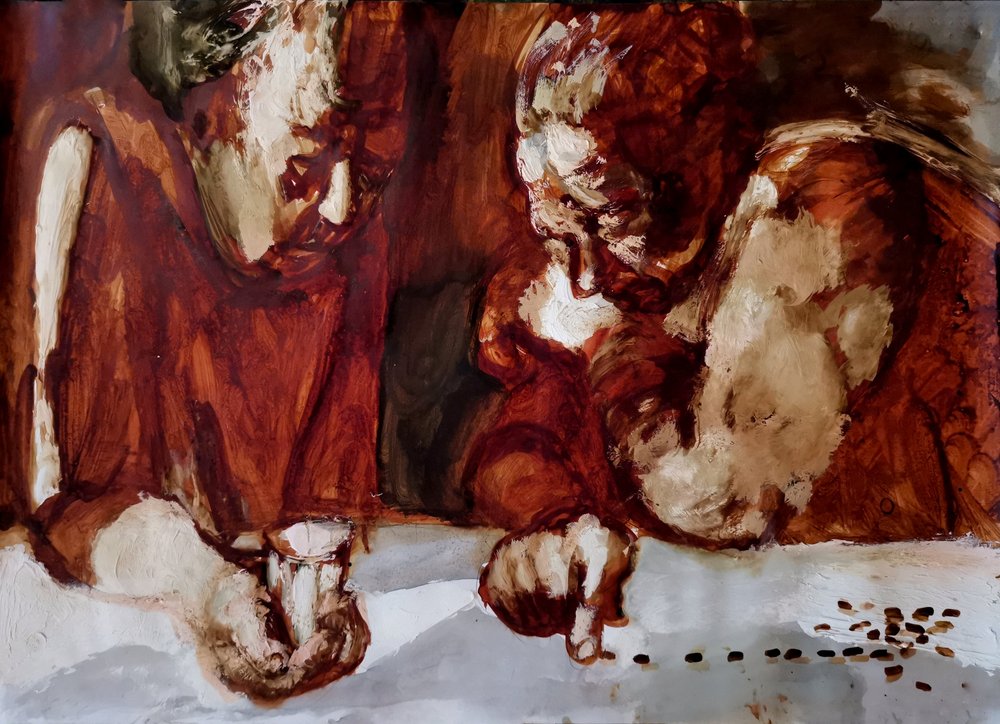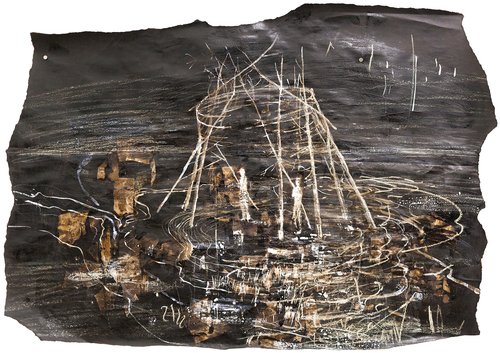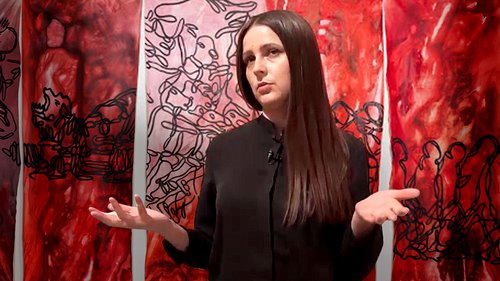Reznikova’s Journey into Dark Waters

Yulia Reznikova. They are picking the seeds, 2024. Courtesy of the artist and Seti Gallery
Russian artist Yulia Reznikova who has two solo exhibitions on currently in Moscow and St. Petersburg, transforms contemporary darkness into her powerful ink drawings, which strip away pretence to reveal raw human emotions in their most elemental forms.
Global tragedies can render artists speechless. In the time in which we are now living, art itself can seem pointless. What images of meaning and artistic value can you produce when the screen of your smartphone overloaded with photos of destroyed buildings, severed limbs and dead children? Over the last three years Theodor Adorno’s quote “To write a poem after Auschwitz is barbaric” has been repeated numerous times in many languages all over social media. For an artist, it takes not only personal courage to respond to brutality, but something in the nature of the talent itself. Yulia Reznikova (b. 1966) is among the few Russian artists who manage to face the horror, and to confront it passionately and openly without hiding her message under a deep veil of obscure symbols. Without alluding to any specific events or persons, she paints an unflattering portrait of Russian society, embroiled in dark passions and violence, yet at the same time suffering and fearful. Or to be precise, she draws rather than paints this portrait since most of her works are ink on paper.
This summer, Reznikova has two exhibitions which are running concurrently in St Petersburg and Moscow, both showing artworks she has created over the last three years. The exhibition at the Zverevsky Centre for the Liberal Arts in Moscow is called ‘Dark Water’. “The one in St. Petersburg is much darker,” the artist told me casually at the opening of the Moscow exhibition, yet to my taste, ‘Dark Water’ is dark enough already. It brings together four dozen ink-on-paper drawings and three large paintings executed on fragments of an old parachute. “To the right is Sovok (a derogatory slang term for the Soviet regime – Ed.), to the left is what’s happening now”, Reznikova explained laconically, pointing to the walls of the exhibition space. Yet the vibe on both sides remains the same. Claustrophobic flashbacks of the artist’s childhood in a provincial garrison and the grim reality of post-2022 Russia blend together seamlessly. The only difference is that the faces of our contemporaries are contorted with rage.
Reznikova strips her compositions of more mundane details and reveals basic emotions of passion, fury, and fear. Her symbols need no curator’s texts with long-winded explanations. The triptych ‘Spring Conscription’ has the solemnity of a religious fresco, where naked bodies of conscripts waiting for medical inspection remind us of the traditional iconography of sinners before the Final Judgment. The giant head of a conscript painted over a discarded parachute is an epitome of blankness. There is no courage and no fear in it – just mere, senseless obedience. Three women are throwing away a baby along with dirty water, a literal illustration of a Russian proverb. The same or similar women are gathered around a table at a wake over a dead canary. “Women are very much connected to life and death,” Reznikova comments. “They wash old people, they give birth to babies. They are also connected with food, with darkness and blood.” Even her depictions of love scenes breathe with violence and pain, rather than joy and excitement. “Passion is not about tenderness or sentimentality,” Reznikova explains. Yet, however grim her characters may look, they are never dehumanized. The artist does not turn them into monsters – on the contrary, she elevates her commonplace subjects to heroes of an ancient myth. A knitting woman becomes one of the Parcae, and a woman kissing a soldier departing for the frontline turns into Venus parting with her Adonis.
“Reznikova is a great artist who has carefully squeezed out the ability to draw,” poet and director of the Zverevsky Centre for Liberal Arts Alexey Sosna said half-jokingly at the opening of ‘Dark Water’. Her style brings to mind the German expressionists or Francis Bacon, or even Goya – to put it simply, all geniuses of the past who were not afraid of dark backgrounds, or dark stories. Paradoxically, an artist who is mesmerized by the dismal depths of the human soul feels at home in the realm of pure forms, too – abstract drawings make up a significant part of her oeuvre. Reznikova’s career is anything but usual. If she has been on the art scene for decades, she has somehow managed to stay out of the mainstream. Her Soviet childhood was rough enough to teach her to stand her ground. “I was expelled from school for tearing apart a kid’s Young Pioneer tie with my teeth,” she tells us matter-of-factly. “I had to enroll in art school to continue my education.”
Reznikova enrolled in the Moscow Art School in Memory of 1905. Her mentor was the legendary Moisey Feigin (1904–2008), the last member of Bubnovy Valet (Jack of Diamonds), a renowned Russian avant-garde artist group. “Feigin was a pupil of Osmerkin, and Osmerkin was a pupil of Van Dongen. So he taught me not the standard academic drawing skills but the drawing method he learned at VKhUTEMAS,” the artist says. After school she enrolled in the Polygraphic Institute, which she found boring, since it could not teach her anything new or exciting. “There was an excellent man there, called Mai Miturich, who said to the other professors: Leave her alone. I am extremely grateful to him for this. That’s how my education ended. My real education was museums and libraries,” Reznikova says.
After graduating in 1994, she made a living designing and illustrating books, working in advertising, and teaching. She is currently a professor of painting and ceramics at the British School of Design in Moscow. She found herself working mostly on paper, in a style evocative of Art Nouveau. She tried to abandon working on paper and turned to painting in 2015. The paintings sold well, Reznikova recalls, and for that very reason she stopped creating them. This paradox is very typical of her. Somehow, she felt that commercial success was a compromise that ruined her artistic integrity. She returned to working on paper and in the 2020s this became her way of coping with a reality that was quickly falling apart. She started painting on discarded parachutes she found near her studio, blindly and stubbornly: “When you paint on it, you don't see what you are doing until it dries,” she explains. On one such parachute, a black, demonic train is rushing at the viewer at full speed. For Reznikova it is a key metaphor of our time. “There is a persistent feeling that we live at the station, and that the whole world is endlessly changing and moving somewhere. It’s a black train that has arrived, that won’t stop.”
Yulia Reznikova. Dark Water
Zverevsky Centre for Liberal Arts
Moscow, Russia
18 June – 7 July 2025
The Force of Gravity. Exhibition of Yulia Reznikova
St Petersburg, Russia
18 May – 14 July 2025




















